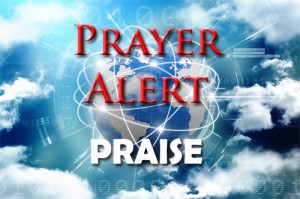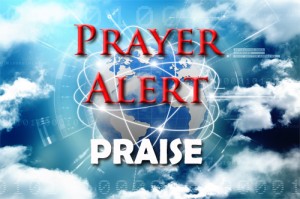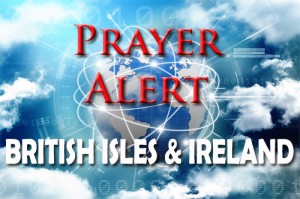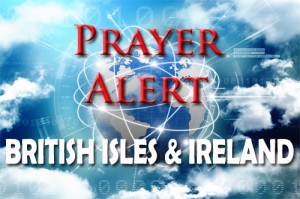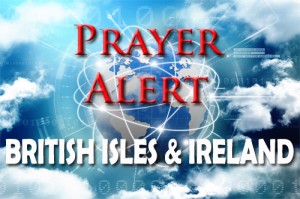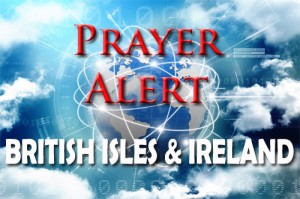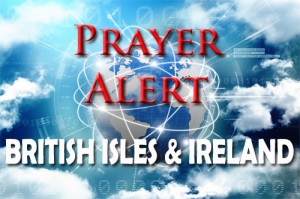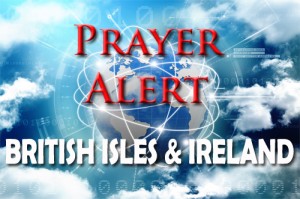
David Fletcher
David Fletcher is Prayer Alert’s Editor.
He is part of a voluntary team who research, proof-read and publish Prayer Alert each week.
If you would like to make a donation towards our running costs, please click here.
A Sri Lankan brick-maker is living with death threats after his conversion to Christianity, often seen as a ‘foreign’ religion, even though Christianity arrived in the Indian sub-continent almost two thousand years ago. Nimal is illiterate, but attended Bible school. When he talks about his faith, many people mock and challenge him. Rising from poverty to set up a small business, Nimal now shares some of his income with his church. Christian charity Open Doors International recently visited Nimal’s family. To watch the video about him, click the ‘More’ button.
The Kingdom Choir, which sang in front of a huge global audience at the royal wedding in May, have now signed a record deal with Sony Music UK. Their debut album comes out in November. Sony Music UK said, ‘Along with the rest of the world, we were stunned by their incredible performance at the royal wedding. The choir believe in love, music and power, and we are excited to capture this on record for their fans across the globe.’
The Italian government recently closed its ports to rescue ships, arguing Italy had taken its fair share of refugees. This week Brussels announced plans to pay EU countries £5,350 to take a refugee, and the Italian foreign minister agreed to allow EU ships carrying rescued migrants to dock at Italian ports (but only for a five-week period). Unfortunately, the interior minister said, ‘If they want to give money to someone else they can do so - Italy doesn’t need charity.’ Italy demands a revision of EU’s anti-trafficking mission in the Mediterranean, as currently rescued migrants automatically disembark at Italian ports.
The Co-operative Academy of Leeds has been working with human rights charity Karma Nirvana to end forced marriages and honour-based abuse. In school education lessons, students were given spoons which they could use if they feared they were being taken abroad to be married in the summer holidays. If they concealed them in their underwear, the spoons would trigger airport metal detectors, and the child would be taken to one side to be searched away from their parent or guardian. This would allow the youngster to tell airport staff that they were being forced into a marriage. Karma Nirvana’s helpline has taken nearly 70,000 calls in ten years. It has worked with the academy for five years, teaching pupils and staff how to be aware of this problem and how to get help if they are affected. See https://www.karmanirvana.org.uk/what-we-do/raising-awareness-education/
Allegations of ‘serious corruption and malpractice’ within the Metropolitan Police are being investigated by the Independent Office for Police Conduct (IOPC). Gross misconduct notices were served on three officers, one of whom is also under criminal investigation, and ‘a number’ of others are being assessed. Investigations are at an early stage and may involve as many as 14 officers, including senior officers who interfered with or curtailed investigations and failed to investigate allegations of wrongdoing. There is also alleged systemic removal of the restrictions of officers under investigation and racial discrimination. According to the Sunday Times, three whistleblowers from the Met told the IOPC that members of the Directorate of Professional Standards (DPS) were shielding officers from a range of allegations. Files have been shredded in the past when allegations of corruption were made, making it hard to prove there was sleaze, bribery or fraud.
Ship of Fools have Mystery Worshippers who visit different churches and denominations with a variety of worship styles and congregation size. They report on what the experience was like and whether they would consider going back. One Mystery Worshipper reported feeling like 'the invisible man', and ‘extremely lonely’. Many reviews noted the only welcome is a quick greeting from someone distributing service sheets. One actually felt bullied by pushy congregation members ‘trying to get me to sign things and buy things’. Mystery Worshippers give us an insight into what it feels like to attend church if you have never been before. People 'like us' are often more easily greeted and assimilated, but people who don’t quite fit can end up invisible and lonely. Alarmingly, one church ‘welcomer’ who stood by the door throughout the service was asked who might feel the most left out. She smiled and replied, 'I think that would be me.'
Street evangelist Allen Coote was arrested outside St Paul's Cathedral for reading the Bible aloud. No members of the public complained: it was cathedral staff who reported him. Allen believes the cathedral’s subsequent concession to allow him just 30 minutes’ speaking time per week was unreasonable and said, ‘The Bible tells us to go into all the world and preach the Gospel to everyone. Now, there are many people on the concourse of St Paul's who come from all the nations of the world, and I was just basically reading what they should hear. Some of them were really pleased to stop and just listen to me.’ The cathedral has a policy to limit any ‘source of disturbance’ outside its doors, in order to offer visitors a ‘welcoming space’. Alan is now supporting a campaign by the Barnabas Fund which is calling on Parliament to pass a new law which specifically protects the right to proclaim the Bible in public.
Jared O'Mara spoke for the first time in the House of Commons, ‘I was elected a year ago as Hallam's first Labour MP but due to mistakes I made - for which I am truly sorry, I hurt a lot of people - I've been unable to speak in the House with confidence until now.’ He spoke of his pride in representing disabled people, as Parliament's ‘first autistic MP, with cerebral palsy and other disabilities’. He also spoke of what can be learned from the teachings of Jesus, although he considers himself ‘a man of science.’ He said, ‘Jesus was a man who forgave those who truly repented, and he shares my belief that our utmost human priority should be helping those who are most disadvantaged and vulnerable amongst us.’ MPs usually gather around their newly elected colleague for maiden speeches, but Jared stood alone at the end of the rear opposition bench.
The BBC has to pay Sir Cliff Richard £850,000 to cover legal costs, following his privacy case against them. He had already been awarded £210,000 damages when the court ruled that the BBC infringed his privacy when reporting a 2014 police raid on his home. Sir Cliff was never charged or arrested. The BBC is also going to pay £315,000 to South Yorkshire Police for legal costs. However the BBC is seeking leave to appeal against the judgment, and wants to challenge Sir Cliff’s right to privacy while a suspect in a police investigation - trumping the broadcaster's right to freedom of expression to publish his name and cover the raid. Lord Patten, former chairman of the BBC Trust, said the BBC would be ‘crazy’ to appeal against the High Court's ruling in this case, saying they should ‘swallow hard, say they made a mistake, apologise, as they have, to Cliff Richard and not to do it again’. See https://www.bbc.co.uk/news/av/uk-44884477/cliff-richard-bbc-would-be-crazy-to-appeal-lord-patten
In February we reported that anti-Semitic hate crimes in the UK had hit a record high, prompting prayers for more visible and frequent prosecutions for such incidents. The Jewish community was targeted almost four times a day last year, which also saw the highest tally of incidents since data gathering began. Three-quarters of all anti-Semitic incidents were in London and Manchester, where most Jewish communities live. Hatred is rising, and Jewish people are suffering as a result. This should concern everybody because it shows anger and division, threatening all society. In 2015 the international community agreed on a definition of anti-Semitism. The UK’s Labour party has not signed up to it, saying its own code of conduct already covers the definition. On 23 July Labour MPs and peers backed the international definition. Jeremy Corbyn disagrees.


